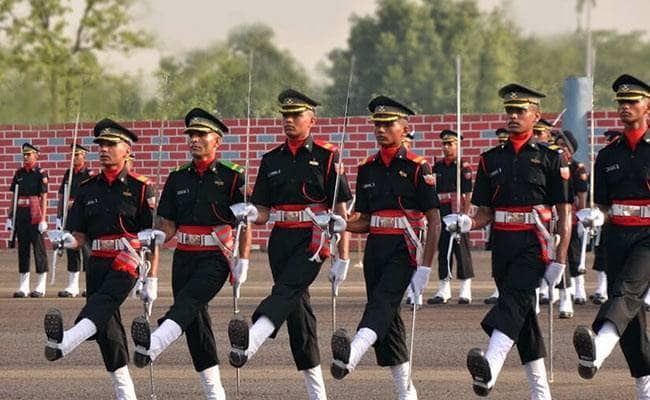The Indian defence forces are trusted with the responsibility of maintaining territorial integrity, defending the country against foreign aggression and insurrections. They provide assistance to civilians in an event of a natural disaster and maintain high standards of operational preparedness to face all the uncertainties. The ministry of defence or Raksha mantralya supervises and coordinates the armed forces of India. The three main forces of Indian defence are the Indian Army, Indian Navy and Indian Air force.
Table of Contents
Role, Capabilities and Modernization of Defence Forces:
The Indian defence forces are ranked on 3rd number(after China & USA) for maintaining the strength of 1.3 million active personnel and 2.1 million beings on the reserved list.
Role, capabilities and modernisation plans of the Indian Army
The Indian Army is known as the largest volunteer army in the world with approximately 9,60,000 reserve troops and over 1 million active troops. The field marshal holds the highest rank in the Indian army. In some exceptional circumstances, the president appoints officers to the Indian Army on the advice of the Union Cabinet of ministers.
The Indian Army has one training command and six tactical commands regulated by the lieutenant-general:
| Command | Headquarters |
| Northern command | Udaipur, Jammu and Kashmir |
| Central command | Lucknow, Uttar Pradesh |
| Western command | Chandimandir, Chandigarh |
| Eastern command | Calcutta |
| South-western command | Jaipur, Rajasthan |
| Southern command | Pune, Maharashtra |
| Army training command | Shimla, Himachal |
The Chief of the Indian Army announced that they are planning to open combat positions for women on 4th June 2017. The Indian Army has different regiments for infantry as stated below:
| Name | Centre |
| Mechanised Infantry | Ahmednagar |
| Armoured Corps | The Armoured Corps Centre and School, Ahmednagar |
| Signal corps | Two training centres at Goa and Jabalpur |
| Artillery Regiment | The School of Artillery, Devlali near Nasik |
| Engineer Corps | Bombay Engineer Group, Khadki near Pune Madras Engineer Group, Bangalore College of Military Engineering, Pune Bengal Engineer Group, Roorkee |
| Corps of Army Aviation | Combat Army Aviation Training School, Nasik. |
| Corps of Army Air Defence | Gopalpur, Odisha |
Armoured vehicles of Indian Army:
- Tata kestrel
- Arjun MK-III- main battle tank
- Abhay IFV
- Futuristic battle tank (FBT)
Modernization plans
- The Army aims to upgrade BMP-II with the latest generation two missile launchers, fire control system and anti-tank guided missiles.
- The Arjun tanks will be upgraded with the latest technology of night fighting capabilities, automated target tracking and laser warning & control systems.
- The Futuristic Infantry Soldier as a system (F-INSAS), a modernisation programme introduced by the Indian Army that will provide Indian soldiers with modern weapons having multiple functions.
Modernisation of the Indian army has encouraged the youth of India to join the army. The selection procedure in the Indian army starts with qualifying government exams such as NDA, NSS etc. Those who are preparing for the NDA exam can approach a recognised institute that can provide them with excellent NDA coaching in Chandigarh.
Role, capabilities and modernisation plans of the Indian Air Force
The Indian Air Force was established on 8th October 1932 during the reign of the British empire. It is known as the air arm of the Indian Defence forces. Britishers honoured the Indian Air force with the prefix “Royal” and since then it is named “Royal Indian Airforce”. The IAF( Indian Airforce) has been involved in wars with neighbouring countries such as China and Pakistan. The major operations conducted by IAF are Operation Meghdoot, Operation Poomalai, Operation Vijay and Operation cactus. Furthermore, the IAF has participated in the peacekeeping missions of the United nations.
The Indian Air Force is divided into two functional and five operational commands:
| Command | Headquarters |
| Maintenance Command (Functional command) | Nagpur, Maharashtra |
| Training Command (Functional command) | Bangalore, Karnataka |
| Central Air Command | Prayagraj, Uttar Pradesh |
| Western Air Command | New Delhi |
| South-western Air Command | Gandhinagar, Gujrat |
| Southern Air Command | Thiruvananthapuram, Kerala |
| Eastern Air Command | Shillong, Meghalaya |
Along with this IAF has several service branches for daily operations, explained below:
| Ground branch | Technical branch | Flying branch |
| Medical & Dental | Engineering | Flying corps |
| logistics | ||
| Accounts | ||
| Administration | ||
| Education | ||
| Meteorological |
Modernisation plans:
- The count of aircraft in the Air force has been decreased due to several crashes and obsolete technology. To cope up with this depletion the IAF has started modernising its aircraft fleet. The companies of Indian Defence such as DRDO and HAL are developing high-tech aircraft: HAL TEDBF, Advanced Medium Combat Aircraft (AMCA), HAL Tejas Mk2, NAL SARAS, DRDO AEW&CS etc. The Akash Missile system has been developed by DRDO and Prithvi II missile will be soon released by DRDO.
- HAL will develop a 5th generation fighter aircraft HAL Amca by the end of 2028. To develop SAM and Barak, DRDO has entered into a joint venture with IAI (Israel Aerospace Industries). Moreover, DRDO is going to develop an air-launched version of BrahMos cruise missile in a joint venture with Russia’s Mashinostroeyenia.
There are countless youngsters who aim to join the Indian Air force. They can enter the air force by cracking the Afcat exam. If they need extra nourishment while preparing for the exam then they can approach a recognized institute that can provide them with superb Afcat coaching in Chandigarh.
Role, capabilities and modernisation plans of the Indian Navy
The Indian Navy was founded in 1612 to provide protection to British shipping merchants. The naval branch of Defence Forces is known as The Indian Navy. The main objective of the navy is to protect the peace of the nation in conjunction with other armed forces of the union. Moreover, they ensure stability and good order in India’s maritime zone in cooperation with the Indian Coast Guard.
The Indian navy is expected to have 55,000 reserve personnel, a fleet of 150 submarines &
Ships and approximately 70,000 active personnel.
The Indian Navy efficiently operates three operational commands headed by a Flag Officer Commanding-in-Chief (FOC-in-C) of Vice Admiral rank.
| Command | Head-Quarters |
| Eastern Naval command | Visakhapatnam |
| Western Naval Command | Mumbai |
| Southern Naval Command | Kochi |
The Indian Navy has its training and operational bases in Maharashtra, Gujarat, Goa, Kerala, Karnataka, Lakshadweep, Odisha, Andhra Pradesh, West Bengal, Tamil Nadu and Andaman & Nicobar Islands. These bases are utilized for several purposes such as forward operating bases, coastal defence, ammunition support, air stations, logistics and maintenance support, missile defence etc. The oldest Naval base in India is INS Shivaji.
Modernisation plans:
- The third-largest naval base i.e. INS Kadamba is initiated with its Phase II expansion. Phase II is upgraded with berthing facilities that can accommodate 40-45 front-line warships, including the aircraft carrier INS Vikramaditya and build a naval air station with a 6000-foot runway.
- In addition to amphibious assault ships and aircraft carriers, the naval forces aim to acquire several surface combatants such as admiral grigorovich class frigates, ASuW corvettes, MCM vessels, Visakhapatnam-class destroyers etc.
There are countless individuals who show zeal and enthusiasm to join the Indian Naval forces. The selection procedure in the Indian Navy starts with cracking the CDS exam. If anyone needs guidance while preparing for the exam, they can join the most prestigious institute that can provide the best CDS coaching in Chandigarh.
Read Also: Celebrities That Wore UGG Boots on Red Carpet
Conclusion
The role, capabilities and modernisation of various defence forces are elaborated in the points above. The aforementioned information can help us deduce that Indian defence forces are efficient enough to combat any terror attack and maintain the peace and security of the nation.




